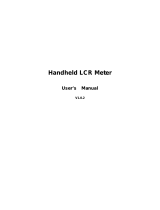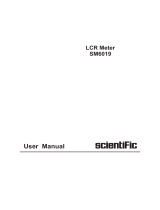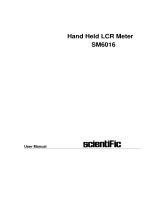Page is loading ...

PSM3750 communications manual
i
IMPORTANT SAFETY INSTRUCTIONS
This equipment is designed to comply with BSEN 61010-1
(Safety requirements for electrical equipment for
measurement, control, and laboratory use) – observe the
following precautions:
This appliance must be earthed. Ensure that the
instrument is powered from a properly grounded supply.
The input connectors are High Voltage safety types for
use up to 500V peak input from earth, overvoltage
category II. Do not exceed 500V peak on any input
connection. Only use test leads that are fitted with
approved High Voltage safety connectors when working
with hazardous voltages.
The inputs must not be connected to signals greater
than is indicated on the front panel.
Keep the ventilation holes on the underneath and sides
free from obstruction.
Do not operate or store under conditions where
condensation may occur or where conducting debris
may enter the case.
There are no user serviceable parts inside the
instrument – do not attempt to open the instrument,
refer service to the manufacturer or his appointed
agent.
Note: Newtons4th Ltd. shall not be liable for any
consequential damages, losses, costs or expenses
arising from the use or misuse of this product
however caused.

PSM3750 communications manual
ii
ABOUT THIS MANUAL
This manual gives details of the communication commands
recognized by the PSM3750 instrument over RS232, USB,
LAN or GPIB. For more general operating instructions for
the instrument refer to the specific user manual.
Each command is listed alphabetically with details of any
arguments and reply. A one line summary of each
command is given in the appendix. Although most of the
commands apply to all instruments in the range there are
some commands that are specific to one instrument or
another.
The information in this manual is believed to be accurate
and complete but Newtons4th Ltd cannot accept any
liability whatsoever for any consequential damage or
losses arising from any errors, inaccuracies, or omissions.
Revision 1.17
This manual is copyright © 2012 - 2017 Newtons4th Ltd.
and all rights are reserved. No part may be copied or
reproduced in any form without prior written consent.
08th June 2017

PSM3750 communications manual
iii
CONTENTS
1 Using remote control .......................................... 1-1
1.1 Standard event status register .................................. 1-3
1.2 Serial Poll status byte .............................................. 1-4
1.3 RS232 connections .................................................. 1-5
2 Communication commands .................................. 2-6
*CLS ................................................................................ 2-6
*ESE ................................................................................ 2-7
*ESR? ............................................................................... 2-8
*IDN? ............................................................................... 2-9
*OPC? ............................................................................ 2-10
*RST .............................................................................. 2-11
*SRE .............................................................................. 2-12
*STB? ............................................................................. 2-14
*TRG .............................................................................. 2-15
*TST? ............................................................................. 2-16
*WAI .............................................................................. 2-17
ABORT ............................................................................ 2-18
ACTRIM .......................................................................... 2-19
ALARM ............................................................................ 2-20
ALARM1 .......................................................................... 2-22
ALARM2 .......................................................................... 2-23
ALARME .......................................................................... 2-24
AMPLIT ........................................................................... 2-26
AUXILI ............................................................................ 2-27
BANDWI.......................................................................... 2-28
BEEP .............................................................................. 2-29
BLANKI ........................................................................... 2-30
CONFIG .......................................................................... 2-31
COUPLI ........................................................................... 2-33
CYCLES ........................................................................... 2-34
DATALO .......................................................................... 2-35
DAV? .............................................................................. 2-37
DAVER ............................................................................ 2-38
DELAY ............................................................................ 2-40
FAST .............................................................................. 2-41
FILTER ............................................................................ 2-42
FRA ................................................................................ 2-43
FREQUE .......................................................................... 2-45
FSWEEP .......................................................................... 2-46

PSM3750 communications manual
iv
GAINPH .......................................................................... 2-47
HARMON ......................................................................... 2-49
HOLD.............................................................................. 2-51
INPUT ............................................................................. 2-52
KEYBOA .......................................................................... 2-53
LCR ................................................................................ 2-54
LOWFRE .......................................................................... 2-56
MARKER .......................................................................... 2-57
MODE ............................................................................. 2-58
MULTIL ........................................................................... 2-59
NEWLOC ......................................................................... 2-61
NOOVER ......................................................................... 2-62
PFCONV .......................................................................... 2-63
OFFSET ........................................................................... 2-64
OUTPUT .......................................................................... 2-65
PAV ................................................................................ 2-66
PHASEM .......................................................................... 2-68
PHCONV .......................................................................... 2-70
PHREF ............................................................................ 2-71
POWER ........................................................................... 2-72
PROGRA .......................................................................... 2-74
RANGE ............................................................................ 2-76
RESOLU .......................................................................... 2-77
RESULT ........................................................................... 2-78
REZERO .......................................................................... 2-80
SCALE ............................................................................ 2-81
SCOPE?........................................................................... 2-82
SCREEN? ......................................................................... 2-83
SETUP ............................................................................ 2-84
SHUNT ............................................................................ 2-86
SMOOTH ......................................................................... 2-87
SPEED ............................................................................ 2-88
START ............................................................................ 2-89
STATUS? ......................................................................... 2-90
STOP .............................................................................. 2-91
SUSPEND ........................................................................ 2-92
TAGREP .......................................................................... 2-93
TEMPER .......................................................................... 2-94
TEMPER? ......................................................................... 2-95
TFA ................................................................................ 2-96
USER? ............................................................................ 2-98
VARCON.......................................................................... 2-99
VECTOR ........................................................................ 2-100
VERSIO? ....................................................................... 2-102

PSM3750 communications manual
v
VRMS ........................................................................... 2-103
WAVEFO ....................................................................... 2-105
WIRING ........................................................................ 2-106
ZERO ............................................................................ 2-107
ZOOM ........................................................................... 2-109
ZOOM? ......................................................................... 2-110

PSM3750 communications manual
1-1
1 Using remote control
The instrument is fitted with an RS232 serial
communications port as standard, and may have an
IEEE488 (GPIB) interface or LAN interface fitted as an
option. All the interfaces use the same ASCII protocol with
the exception of the end of line terminators:
Rx expects
Tx sends
RS232,
LAN, USB
carriage return
(line feed ignored)
carriage return
and line feed
IEEE488
carriage return or
line feed or EOI
carriage return
with EOI
All the functions of the instrument can be programmed via
either interface, and results read back. When the IEEE488
interface is set to ‘remote’ the RS232 port is ignored.
The commands are not case sensitive and white space
characters are ignored (e.g. tabs and spaces). Replies
from the instrument are always upper case, delimited by
commas, without spaces.
Only the first six characters of any command are important
– any further characters will be ignored. For example, the
command to set the generator frequency is FREQUE but
the full word FREQUENCY may be sent as the redundant
NCY at the end will be ignored.
Fields within a command are delimited by comma, multiple
commands can be sent on one line delimited with a semi-
colon. Eg.
AMPLIT,1.5;OUTPUT,ON
Mandatory commands specified in the IEEE488.2 protocol
have been implemented, (e.g. *IDN?, *RST) and all
commands that expect a reply (query commands) are
terminated with a question mark.

PSM3750 communications manual
1-2
The instrument maintains an error status byte consistent
with the requirements of the IEEE488.2 protocol (called
the standard event status register) that can be read by the
mandatory command *ESR? (see section 5.1).
The instrument also maintains a status byte consistent
with the requirements of the IEEE488.2 protocol, that can
be read either with the IEEE488 serial poll function or by
the mandatory command *STB? over RS232 or IEEE or
LAN (see section 5.2).
The IEEE address defaults to 23 and can be changed via
the COMMS menu.
The keyboard is disabled when the instrument is set to
“remote” using the IEEE. Press HOME to return to “local”
operation.
RS232 data format is: start bit, 8 data bits (no parity), 1
stop bit. Flow control is RTS/CTS (see section 5.2), baud
rate is selectable via the COMMS menu.
A summary of the available commands is given in the
Appendix. Details of each command are given in the
communication command section of the manual.
Commands are executed in sequence except for two
special characters that are immediately obeyed:
Control T (20) – reset interface (device clear)
Control U (21) – warm restart

PSM3750 communications manual
1-3
1.1 Standard event status register
PON
CME
EXE
DDE
QYE
OPC
bit 0 OPC (operation complete)
cleared by most commands
set when data available or sweep complete
bit 2 QYE (unterminated query error)
set if no message ready when data read
bit 3 DDE (device dependent error)
set when the instrument has an error
bit 4 EXE (execution error)
set when the command cannot be executed
bit 5 CME (command interpretation error)
set when a command has not been recognised
bit 7 PON (power on event)
set when power first applied or unit has reset
The bits in the standard event status register except for
OPC are set by the relevant event and cleared by specific
command (*ESR?, *CLS, *RST). OPC is also cleared by
most commands that change any part of the configuration
of the instrument (such as MODE or START).

PSM3750 communications manual
1-4
1.2 Serial Poll status byte
ESB
MAV
ALM
SDV
RDV
bit 0 RDV (result data available)
set when results are available to be read as
enabled by DAVER
bit 1 SDV (sweep data available)
set when sweep results are available to be
read as enabled by DAVER
bit 3 ALA (alarm active)
set when an alarm is active and enabled by
ALARMER
bit 4 MAV (message available)
set when a message reply is waiting to be read
bit 5 ESB (standard event summary bit)
set if any bit in the standard event status
register is set as well as the corresponding bit
in the standard event status enable register
(set by *ESE).

PSM3750 communications manual
1-5
1.3 RS232 connections
The RS232 port on the instrument uses the same pinout as
a standard 9 pin serial port on a PC or laptop (9-pin male
‘D’ type).
Pin
Function
Direction
1
DCD
in (+ weak pull up)
2
RX data
in
3
TX data
out
4
DTR
out
5
GND
6
DSR
not used
7
RTS
out
8
CTS
in
9
RI
not used
The instrument will only transmit when CTS (pin 8) is
asserted, and can only receive if DCD (pin 1) is asserted.
The instrument constantly asserts (+12V) DTR (pin 4) so
this pin can be connected to any unwanted modem control
inputs to force operation without handshaking. The
instrument has a weak pull up on pin 1 as many null
modem cables leave it open circuit. In electrically noisy
environments, this pin should be driven or connected to
pin 4.
To connect the instrument to a PC, use a 9 pin female to 9
pin female null modem cable:
1 & 6
-
4
2
-
3
3
-
2
4
-
1 & 6
5
-
5
7
-
8
8
-
7

PSM3750 communications manual
2-7
*ESE
*ESE
Function:
Set standard event status enable register.
Description:
Enable which bits of the standard event
status register set the ESB bit in the serial
poll status byte..
Format:
*ESE, value
Arguments:
decimal equivalent of bits in standard
event status enable register
Reply:
can be read by *ESE?
Example:
*ESE, 60
Notes:
The following bits in the standard event
status enable register have been
implemented:
bit 0 OPC (operation complete)
bit 2 QYE (unterminated query error)
bit 3 DDE (device dependent error)
bit 4 EXE (execution error)
bit 5 CME (command interpretation error)
bit 7 PON (power on event)
For example, *ESE, 60 enables all the
error bits so that the ESB bit in the serial
poll status byte is set in the event of any
error.

PSM3750 communications manual
2-8
*ESR?
*ESR?
Function:
Standard event status register query
Description:
Returns the contents of the standard
event status register and clears it.
Format:
*ESR?
Arguments:
none
Reply:
decimal equivalent of bits in standard
event status register
Example:
*ESR?
33
Notes:
The following bits in the standard event
status register have been implemented:
bit 0 OPC (operation complete)
bit 2 QYE (unterminated query error)
bit 3 DDE (device dependent error)
bit 4 EXE (execution error)
bit 5 CME (command interpretation error)
bit 7 PON (power on event)
For example, if a command is sent
incorrectly and is not recognised, the CME
bit will be set and the value of 33 will be
returned.

PSM3750 communications manual
2-10
*OPC?
*OPC?
Function:
Test for operation complete
Description:
Returns 1 if previous operation is
completed, 0 if not.
Format:
*OPC?
Arguments:
none
Reply:
0 or 1
Example:
START
*OPC?
0
*OPC?
0
*OPC?
1
Notes:
*OPC? can be used to indicate when data
is available or when a frequency sweep
has completed.

PSM3750 communications manual
2-11
*RST
*RST
Function:
Reset
Description:
Resets the instrument to the default state
and clears the standard event status
register.
Format:
*RST
Arguments:
none
Reply:
none
Example:
*RST
Notes:
The *RST command loads the default
configuration. This is the same as loading
the default configuration via the
PROGRAM menu.
Any preceding setup commands will be
overwritten.
*RST should be followed by an end of line
not a message separator. It may be
helpful to follow it with a short pause to
allow the new configuration to become
active before sending further commands.

PSM3750 communications manual
2-12
*SRE
*SRE
Function:
Set service request enable register.
Description:
Enable which bits of the status byte
register initiate a service request.
Format:
*SRE, value
Arguments:
decimal equivalent of bits in status byte
register
Reply:
can be read by *SRE?
Example:
*SRE, 1
generate a service request when data
available.
Notes:

PSM3750 communications manual
2-13
*SRE?
*SRE?
Function:
Read service request enable register.
Description:
Read back the present setting of the
service request enable register.
Format:
*SRE?
Arguments:
Reply:
decimal equivalent of bits in status byte
register that would generate a service
request.
Example:
*SRE?
1
Notes:
/














